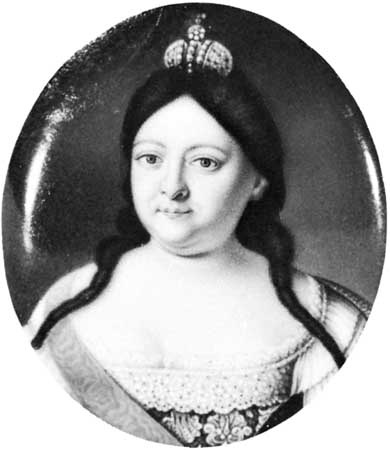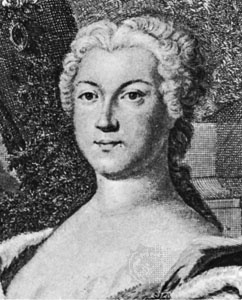Anna
empress of Russia
in full Anna Ivanovna
born Jan. 28 【Feb. 7, New Style】, 1693, Moscow, Russia
died Oct. 17 【Oct. 28】, 1740, St. Petersburg
 empress of Russia from 1730 to 1740.
empress of Russia from 1730 to 1740.Daughter of Ivan V (reigned 1682–96) and niece of Peter I the Great (reigned 1682–1725), Anna was married to Frederick William, ruler of the Baltic seacoast duchy of Courland, on Oct. 31 (Nov. 11), 1710. Although her husband died on the journey to Courland after their wedding in St. Petersburg, Anna remained at Mitau (now Jelgava, Latvia), the capital of Courland, until 1730, when Peter II died and the Supreme Privy Council, the actual ruling body in Russia (1726–30), offered her the Russian throne.
Having accepted the council's proposal as well as its stipulation that she agree to certain “conditions” placing the real power of the state in the council's hands and effectively creating a limited monarchy in Russia, Anna proceeded to Moscow (February 1730, Old Style). But when she arrived and found widespread opposition to the council's conditions among the gentry and officers of the guard, she tore up the conditions (February 25), abolished the Supreme Privy Council, and reestablished the autocracy.
Anna, however, had little interest in government affairs and relied heavily on her lover, Ernst Johann Biron, and a small group of German advisers, including the head of Russia's foreign affairs, Andrey Osterman, and the chief of the army, Burkhard Münnich, to manage the state. While the empress concerned herself primarily with extravagant entertainments and crude amusements in the court at St. Petersburg, her favourites engaged Russia in the War of the Polish Succession (Polish Succession, War of the) (1733–35), which placed a pro-Russian king on the Polish throne, and in the Russo-Turkish War (Russo-Turkish wars) of 1736–39. The outcome of the Russo-Turkish War scarcely justified its tremendous cost in life and money, since the territory Russia gained by the war still left it lacking a warm-water outlet to the sea. In addition, Anna's ruling clique, which employed excessively brutal and repressive practices against its opponents, alienated the gentry, which resented domination by German officials. The increased expenditures of the court, combined with war expenses, led to a relentless extortion of taxes from the peasantry, whose social status steadily deteriorated in contrast with the advantages gained by the upper classes.
Shortly before her death Anna named as her successor Ivan, the son of her niece Anna Leopoldovna, and Biron as the infant's regent.
regent of Russia
in full Anna Leopoldovna
born Dec. 7 【Dec. 18, New Style】, 1718, Rostock, Mecklenburg 【Germany】
died March 7 【March 18】, 1746, Kholmogory, Russia
 regent of Russia (November 1740–November 1741) for her son, the emperor Ivan VI.
regent of Russia (November 1740–November 1741) for her son, the emperor Ivan VI.A niece of Empress Anna (reigned 1730–40), Anna Leopoldovna married a nephew of the Holy Roman emperor Charles VI in 1739 and gave birth to a son, Ivan (Aug. 2 【Aug. 13】, 1740), who was named heir to the Russian throne by Empress Anna in 1740, shortly before she died.
A few weeks later, however, the empress's appointed regent, Ernst Johann Biron, was arrested by certain members of the ruling German clique in Russia, led by Burkhard Münnich and Andrey Osterman. Münnich and Osterman appointed Anna Leopoldovna regent and assumed dominant positions in her government. But they were unpopular among the Russians, and, when they weakened the administration by quarreling with each other, Anna's major rival, Elizabeth, the daughter of Peter I the Great (reigned 1682–1725), staged a palace revolution (Nov. 25 【Dec. 6】, 1741). Elizabeth imprisoned Anna and her family in 1742 and in 1744 exiled them to Kholmogory, where Anna died.
- Mannai
- Mannar, Gulf of
- Mannar Island
- Manned Spaceflights, 1995
- Manned Spaceflights, 1996
- Manner, Eeva Liisa
- Mannerheim, Carl Gustaf
- Mannerism
- manners, comedy of
- Mannes, Leopold
- Mannes, Marya
- Mannheim
- Mannheim, Karl
- Mannheim school
- Mann, Heinrich
- Mann, Horace
- mannikin
- Manning, Henry Edward
- Manning, James
- Manning, Marie
- Manning, Olivia
- Manning, Peyton
- Mannix, Daniel
- Mannlicher, Ferdinand, Ritter von
- Mann, Thomas